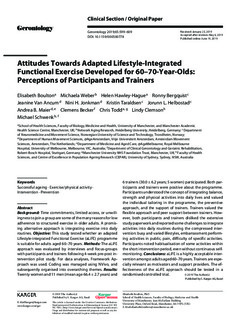| dc.contributor.author | Boulton, Elisabeth | |
| dc.contributor.author | Weber, Michaela | |
| dc.contributor.author | Hawley-Hague, Helen | |
| dc.contributor.author | Bergquist, Ronny | |
| dc.contributor.author | Van Ancum, Jeanine M. | |
| dc.contributor.author | Jonkman, Nini H. | |
| dc.contributor.author | Taraldsen, Kristin | |
| dc.contributor.author | Helbostad, Jorunn L. | |
| dc.contributor.author | Maier, Andrea B. | |
| dc.contributor.author | Becker, Clemens | |
| dc.contributor.author | Todd, Chris | |
| dc.contributor.author | Clemson, Lindy | |
| dc.contributor.author | Schwenk, Michael | |
| dc.date.accessioned | 2020-03-04T07:29:27Z | |
| dc.date.available | 2020-03-04T07:29:27Z | |
| dc.date.created | 2020-03-03T14:40:02Z | |
| dc.date.issued | 2019 | |
| dc.identifier.citation | Gerontology. 2019, 65, 599–609 | nb_NO |
| dc.identifier.issn | 0304-324X | |
| dc.identifier.uri | http://hdl.handle.net/11250/2645052 | |
| dc.description.abstract | Background: Time commitments, limited access, or unwillingness to join a group are some of the many reasons for low adherence to structured exercise in older adults. A promising alternative approach is integrating exercise into daily routines. Objective: This study tested whether an adapted Lifestyle-integrated Functional Exercise (aLiFE) programme is suitable for adults aged 60–70 years. Methods: The aLiFE approach was evaluated by interviews and focus-groups with participants and trainers following 4-week pre-post intervention pilot study. For data analyses, Framework Approach was used. Coding was managed using NVivo, and subsequently organised into overarching themes. Results: Twenty women and 11 men (mean age 66.4 ± 2.7 years) and 6 trainers (30.0 ± 6.2 years; 5 women) participated. Both participants and trainers were positive about the programme. Participants understood the concept of integrating balance, strength and physical activities into daily lives and valued the individual tailoring in the programme, the preventive approach, and the support of trainers. Trainers valued the flexible approach and peer support between trainers. However, both participants and trainers disliked the extensive study paperwork and reported some challenges to integrate activities into daily routines during the compressed intervention: busy and varied lifestyles, embarrassment performing activities in public, pain, difficulty of specific activities. Participants noted habitualisation of some activities within the short intervention period, even without continuous self-monitoring. Conclusions: aLiFE is a highly acceptable intervention amongst adults aged 60–70 years. Trainers are especially relevant as motivators and support providers. The effectiveness of the aLiFE approach should be tested in a randomised controlled trial. | nb_NO |
| dc.language.iso | eng | nb_NO |
| dc.publisher | Karger | nb_NO |
| dc.rights | Attribution-NonCommercial-NoDerivatives 4.0 Internasjonal | * |
| dc.rights.uri | http://creativecommons.org/licenses/by-nc-nd/4.0/deed.no | * |
| dc.title | Attitudes Towards Adapted Lifestyle-Integrated Functional Exercise Developed for 60-70-Year-Olds: Perceptions of Participants and Trainers | nb_NO |
| dc.type | Journal article | nb_NO |
| dc.type | Peer reviewed | nb_NO |
| dc.description.version | publishedVersion | nb_NO |
| dc.source.pagenumber | 599-609 | nb_NO |
| dc.source.volume | 65 | nb_NO |
| dc.source.journal | Gerontology | nb_NO |
| dc.identifier.doi | 10.1159/000500778 | |
| dc.identifier.cristin | 1799354 | |
| dc.description.localcode | This article is licensed under the Creative Commons Attribution-NonCommercial-NoDerivatives 4.0 International License (CC BY-NC-ND). | nb_NO |
| cristin.unitcode | 194,65,30,0 | |
| cristin.unitcode | 1920,7,0,0 | |
| cristin.unitname | Institutt for nevromedisin og bevegelsesvitenskap | |
| cristin.unitname | Klinikk for kliniske servicefunksjoner | |
| cristin.ispublished | true | |
| cristin.fulltext | original | |
| cristin.qualitycode | 1 | |

